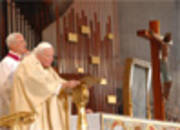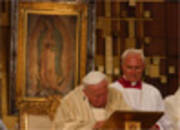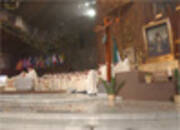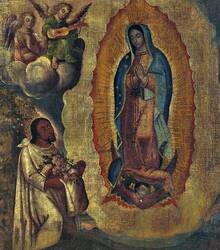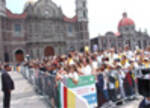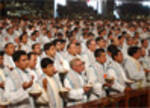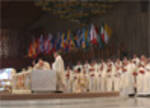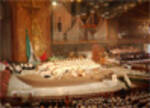Blessed John Paul II's Apostolic Visit to Mexico
30th July - 2nd August 2002
Blessed John Paul II's Address on Arrival at Mexico City:
"I am filled with great joy at being able to come to this hospitable land for the 5th time. It was here that I began my Apostolic travels which have taken me as the Successor of the Apostle Peter to so many parts of the world, bringing me close to many men and women to strengthen them in their faith in our Saviour, Jesus Christ.
After celebrating the 17th World Youth Day in Toronto, today I have had the good fortune to add to the list of saints a wonderful evangelizer from this continent: Brother Pedro de San José de Betancurt. Tomorrow, with deep joy I shall canonize Juan Diego, and on the following day I shall beatify 2 other compatriots of yours: Juan Bautista and Jacinto de los Ángeles, who will thus join these beautiful examples of holiness in these beloved American countries, where the Christian message has been welcomed with open hearts, permeating their cultures and bringing forth abundant fruit.
I am grateful for the friendly words of welcome which the President has addressed to me on behalf of all Mexicans. I would like to reciprocate by renewing once more my sentiments of affection and esteem for this people with their wealth of history and ancestral cultures. I encourage everybody to work for the building up of an ever renewed homeland and for the country’s continual progress. I greet with affection the Cardinals and Bishops, the dear priests, men and women religious, all the faithful who day by day endeavour to practise the Christian faith and make the words that are the hope and programme of the future come true: "Mexico ever faithful!". From here I also send an affectionate greeting to the young people gathered at a prayer vigil in Plaza del Zócalo in front of the Primatial Cathedral, and I tell them that the Pope is counting on them and asking them to be true friends of Jesus and witnesses to his Gospel.
Dear Mexicans: thank you for your hospitality, for your constant affection, for your fidelity to the Church. Continue to be faithful on this journey, encouraged by the marvellous examples of holiness born in this noble nation. Be holy! Repeating what I said to you in the Basilica of Guadalupe in 1990, serve God, the Church and the nation, each one assuming personal responsibility for passing on the Gospel message and witnessing to a faith that is alive and active in society.
I cordially bless each one of you, with the words which your ancestors addressed to their loved ones: "May God make you like Juan Diego!" "México siempre fiel!"
- 30th July 2002 - in English, French, German, Italian, Portuguese & Spanish
John Paul II's homily at the canonization of Juan Diego Cuauhtlatoatzin
Basilica of Our Lady of Guadalupe, 31st July 2002
- in English, French, German, Italian, Portuguese & Spanish
1. "I thank you, Father ... that you have hidden these things from the wise and understanding and revealed them to babes; yea, Father, for such was your gracious will" (Mt 11:25-26).
Dear Brothers and Sisters,
These words of Jesus in today's Gospel are a special invitation to us to praise and thank God for the gift of the first indigenous saint of the American continent.
With deep joy I have come on pilgrimage to this Basilica of Our Lady of Guadalupe, the Marian heart of Mexico and of America, to proclaim the holiness of Juan Diego Cuauhtlatoatzin, the simple, humble Indian who contemplated the sweet and serene face of Our Lady of Tepeyac, so dear to the people of Mexico.
2. I am grateful for the kind words of Cardinal Norberto Rivera Carrera, Archbishop of Mexico City, and for the warm hospitality of the people of this Primatial Archdiocese: my cordial greeting goes to everyone...
Today I address a very affectionate greeting to the many indigenous people who have come from the different regions of the country, representing the various ethnic groups and cultures which make up the rich, multifaceted Mexican reality. The Pope expresses his closeness to them, his deep respect and admiration, and receives them fraternally in the Lord's name.
3. What was Juan Diego like? Why did God look upon him? The Book of Sirach, as we have heard, teaches us that God alone "is mighty; he is glorified by the humble" (cf Sir 3:20). Saint Paul's words, also proclaimed at this celebration, shed light on the divine way of bringing about salvation: "God chose what is low and despised in the world ... so that no human being might boast in the presence of God" (1 Cor 1:28,29).
It is moving to read the accounts of Guadalupe, sensitively written and steeped in tenderness. In them the Virgin Mary, the handmaid "who glorified the Lord" (Lk 1:46), reveals herself to Juan Diego as the Mother of the true God. As a sign, she gives him precious roses, and as he shows them to the Bishop, he discovers the blessed image of Our Lady imprinted on his tilma.
"The Guadalupe Event", as the Mexican Episcopate has pointed out, "meant the beginning of evangelization with a vitality that surpassed all expectations. Christ's message, through his Mother, took up the central elements of the indigenous culture, purified them and gave them the definitive sense of salvation" (14 May 2002 no 8). Consequently Guadalupe and Juan Diego have a deep ecclesial and missionary meaning and are a model of perfectly inculturated evangelization.
4. "The Lord looks down from heaven, he sees all the sons of men" (Ps 33:13), we recited with the Psalmist, once again confessing our faith in God, who makes no distinctions of race or culture. In accepting the Christian message without forgoing his indigenous identity, Juan Diego discovered the profound truth of the new humanity, in which all are called to be children of God. Thus he facilitated the fruitful meeting of two worlds and became the catalyst for the new Mexican identity, closely united to Our Lady of Guadalupe, whose mestizo face expresses her spiritual motherhood which embraces all Mexicans. This is why the witness of his life must continue to be the inspiration for the building up of the Mexican nation, encouraging brotherhood among all its children and ever helping to reconcile Mexico with its origins, values and traditions.
The noble task of building a better Mexico, with greater justice and solidarity, demands the cooperation of all. In particular, it is necessary today to support the indigenous peoples in their legitimate aspirations, respecting and defending the authentic values of each ethnic group. Mexico needs its indigenous peoples and these peoples need Mexico!
Beloved bothers and sisters of every ethnic background of Mexico and America, today, in praising the Indian Juan Diego, I want to express to all of you the closeness of the Church and the Pope, embracing you with love and encouraging you to overcome with hope the difficult times you are going through.
5. At this decisive moment in Mexico's history, having already crossed the threshold of the new millennium, I entrust to the powerful intercession of Saint Juan Diego the joys and hopes, the fears and anxieties of the beloved Mexican people, whom I carry in my heart.
Blessed Juan Diego, a good, Christian Indian, whom simple people have always considered a saint! We ask you to accompany the Church on her pilgrimage in Mexico, so that she may be more evangelizing and more missionary each day. Encourage the Bishops, support the priests, inspire new and holy vocations, help all those who give their lives to the cause of Christ and the spread of his Kingdom.
Happy Juan Diego, true and faithful man! We entrust to you our lay brothers and sisters so that, feeling the call to holiness, they may imbue every area of social life with the spirit of the Gospel. Bless families, strengthen spouses in their marriage, sustain the efforts of parents to give their children a Christian upbringing. Look with favour upon the pain of those who are suffering in body or in spirit, on those afflicted by poverty, loneliness, marginalization or ignorance. May all people, civic leaders and ordinary citizens, always act in accordance with the demands of justice and with respect for the dignity of each person, so that in this way peace may be reinforced.
Beloved Juan Diego, "the talking eagle"! Show us the way that leads to the "Dark Virgin" of Tepeyac, that she may receive us in the depths of her heart, for she is the loving, compassionate Mother who guides us to the true God. Amen.
John Paul II's homily at the beatification of Juan Bautista and Jacinto de los Ángeles
Basilica of Our Lady of Guadalupe, Mexico City, 1st August 2002
- in English, French, German, Italian, Portuguese & Spanish
Dear Brothers and Sisters,
1. "Blessed are those who are persecuted for righteousness'sake, for theirs is the kingdom of heaven" (Mt 5:10). In the Gospel Beatitudes, we find this final exhortation not to be discouraged at the persecutions which the Church has faced from the very beginning. In the Sermon on the Mount, Jesus promises true happiness to those who are poor in spirit, who mourn or who are meek; and also to those who hunger and thirst after righteousness, who act with mercy or are pure of heart.
Faced with the human suffering that accompanies the journey of faith, St Peter urges: "Rejoice insofar as you share Christ's sufferings, that you may also rejoice and be glad when his glory is revealed" (1 Pt 4:13). With this conviction, Juan Bautista and Jacinto de los Ángeles faced martyrdom, remaining faithful to their devotion to the true, living God and rejecting idols.
As they were being tortured, they were invited to renounce their Catholic faith and save themselves. But they answered bravely: "Once we have professed Baptism, we shall always follow the true religion": a beautiful example of how nothing, not even our life, should be put before our baptismal commitment. This is the same example given by the early Christians, who, born to new life through Baptism, abandoned all forms of idolatry.
2. I greet with affection the Cardinals and Bishops who have gathered in this Basilica, and in particular Archbishop Héctor González Martínez of Oaxaca, and the priests, religious and lay faithful, especially those who have come from Oaxaca, the birthplace of the new "Blesseds" where their memory is still very much alive.
Your land is a rich mixture of cultures. The Gospel arrived there in 1529 with the Dominican Fathers who used the native languages and the manners and customs of the local communities. Thus your land came to know God in the local languages. These two great martyrs stand out among the fruit of this Christian seed.
3. In the second reading, St Peter has reminded us that if someone "suffers as a Christian, let him not be ashamed, but under that name let him glorify God" (1 Pt 4:16). Juan Bautista and Jacinto de los Ángeles, who shed their blood for Christ, are true martyrs of the faith. Like the Apostle Paul, they could have asked themselves: "Who shall separate us from the love of Christ? Shall tribulation, or distress, or persecution, or famine, or nakedness, or peril, or sword?" (Rom 8:35).
These two indigenous Christians, whose personal and family life was irreproachable, suffered martyrdom for their fidelity to the Catholic faith, happy to have been baptized. They are an example to the lay faithful, who are called to sanctify themselves in the ordinary circumstances of everyday life.
4. With this beatification, the Church emphasizes the mission to proclaim the Gospel to all peoples. The new "Blesseds", fruit of the holiness of the First Evangelization among the Zapotec Indians, encourage indigenous people today to appreciate their cultures and languages, and above all their dignity as children of God. This dignity must be respected by others in the context of the Mexican nation, made up of peoples of many different origins but willing to build a common family in solidarity and justice.
The two "Blesseds" are an example of how, without regarding one's ancestral customs as myths, one can reach God without renouncing one's own culture but letting oneself be enlightened by the light of Christ, which renews the religious spirit of the best popular traditions.
5. "The Lord has done great things for us; we are glad" (Ps 125:3). With the Psalmist's words, our hearts are filled with joy, for God has blessed the Church of Oaxaca and the Mexican people with two of their children who today are raised to the glory of the altar. Exemplary in carrying out their public duties, they are a model for everyone, in the little villages or in the large social structures, whose duty it is to promote the common good with great care and selflessness.
Juan Bautista and Jacinto de los Ángeles, husbands and fathers of families, and men whose conduct - as their fellow citizens recognized at the time - was blameless, remind Mexican families today of the greatness of their vocation, the value of fidelity and love, and the generous acceptance of life.
May the Church therefore rejoice, for with these new "Blesseds" she has received clear proof of God's love for us. May the Christian community of Oaxaca and the whole of Mexico also rejoice, for the Almighty has looked upon two of their sons.
6. Before the sweet face of Our Lady of Guadalupe, who has been a constant support of the faith of her Mexican children, let us renew the commitment to evangelization which also distinguished Juan Bautista and Jacinto de los Ángeles. Let us enable all the Christian communities to share in this task, so that they may proclaim their faith with enthusiasm and pass it on in its entirety to future generations. Evangelize by strengthening the bonds of fraternal communion and by witnessing to your faith by an exemplary life, in the family, at work and in social relations! Seek the Kingdom of God and his justice here on earth through effective, brotherly solidarity with the neediest and the marginalized! Be the builders of hope for all society!
Let us express to our Mother in heaven the joy we feel at seeing two children of hers raised to the altar, asking her at the same time to bless, console and help the beloved Mexican people and all America, as she always has from this Shrine of Tepeyac.
Before the final blessing, Blessed John Paul II said
Here I have felt your veneration and the chance to return has been the cause of great spiritual happiness for me, for which I thank God and Mary. Thanks also to all of you who have prepared my visit, taking care of all the details. Thanks to all of you who with great affection have welcomed me in the streets of the city, to those who have come from far away, to those who listened and welcomed the message I leave you, to those who pray so much for my ministry as successor of St Peter. As I get ready to leave this blessed land, what comes from the heart is what the popular song says in Spanish: "I go but I do not leave. I go but I will be absent, then, even if I go, in my heart I stay'. Mexico! Mexico! beautiful Mexico, God bless you!

